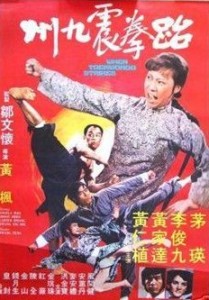When Tae Kwon Do Strikes
跆拳震九州
Hong Kong, 1973, colour, 2.35:1, 92 mins.
Director: Huang Feng 黄枫.
Rating: 6/10.
The fights are long, fast and furious in this tale of Chinese-Japanese conflict in Korea and Manchuria.
Seoul, early 1930s, during the Japanese occupation of Korea. Gim Jeong-shik (Huang Jiada), a patriotic Korean who is studying taekwondo under resistance leader Ri Jun-dong (Ri Jun-gu), is attacked in the street by some Japanese from the Bansan Karate School. He takes refuge in a Catholic church run by Louis (Andre Morgan), a French priest, whose niece Marie (Anne Winton) is also a student of Ri Jun-dong. The Japanese fighters arrive at the church but are stopped by Ri Jun-dong himself, who works incognito as a gardener there. A group of Japanese ronin later comes to the church and their leader (Hong Jinbao) unsuccessfully tries to arrest Ri Jun-dong; later, Louis is arrested by the Japanese and taken to their prison cells beneath Bansan Karate School, whose premises Gim Jeong-shik suspects are being used to traffick kidnapped local women to Japan. Ri Jun-dong asks one of his pupils, Korea-born Chinese Huang Lichun (Mao Ying) who runs a Chinese restaurant with her mother (Hong Wei), to go to the church and find out how Louis is. She’s attacked by the Japanese fighters, but she kills their leader (Qian Yuesheng) and finds out where Louis is held. After telling Ri Jun-dong back at the restaurant, she is threatened by the leader (Chen Quan) of the Japanese fighter she killed and is then attacked by the Japanese ronin. During the fighting, her mother dies. She swears to get vengeance and joins Yi Jun-dong’s resistance movement. Meanwhile, Marie tries to get the karate school head (Kazama Kenji) to release her uncle.
REVIEW
Now that the Li Xiaolong 李小龙 [Bruce Lee] film spring has finally dried up (only a drastically cut version of a documentary on him remains to be released by Cathay [as of late 1974/early 1975]), we can at last savour some of Golden Harvest’s other star vehicles. Number Two in the Martial Firmament is undoubtedly the petite Mao Ying 茅瑛 [Angela Mao], about whom I have rhapsodised before. Until the seminal The Fate of Lee Khan 迎春阁之风波 (1973) is released, this present work will do very nicely. Directed by Huang Feng 黄枫, under whose aegis Mao has made the majority of her films to date, When Tae Kwon Do Strikes 跆拳震九州 features her in a considerably more combatant mood than in Hap Ki Do 合气道 (1972). There is no mistaking the star quality of her performance – clearly demonstrated by the fact that the film hangs fire for the first 20 minutes until she makes her first appearance. Despite the equal billing of Ri Jun-gu 리준구 | 李俊九 [Jhoon Rhee] (a Korean American taekwondo expert) he is conspicuously lacking in the authority that Mao possesses on screen: the fights are long, fast and furious, and Huang rivets the viewer’s attention despite the usual Golden Harvest lack of superhuman feats. Photography, sets and lighting all have the bright, uncluttered look of GH productions, and the story is unexpectedly ruthless in whom it chooses to eliminate. When Tae Kwon Do Strikes – taekwondo is another form of combat, and the plot is concerned with the fight against Japanese domination in Korea and Manchuria – is amazing for the depth of its anti-Jap feeling. Though this is a persistent feature of all Hong Kong production, a pivotal element in fact for most of the plots, the present film is considerably more violent in its portrayal of bestial, corrupt Japanese. Much visual fun is extracted by showing fallen enemies in particularly undignified positions (exposed cod-pieces and all), while the music track even resorts at one point (Mao’s confrontation in the church) to using That Famous Chord from Also sprach Zarathustra. The injection of two Americans [in the dubbed version; French in the original] into the plot weakens the Chinese-Japanese conflict and holds up the story at crucial points, but with the sublime combination of Mao and Huang at the helm little can go wrong.
CREDITS
Presented by Golden Harvest (HK). Produced by Golden Film (HK).
Script: Zhu Yu. Photography: Li Youtang. Editing: Zhang Yaozong. Music: Li Zhaohua. Art direction: Qian Sen. Costumes: Zhu Shengxi. Sound: Zhou Shaolong, Wang Ping. Action: Zhu Yuanlong [Hong Jinbao/Sammo Hung], Chen Quan.
Cast: Mao Ying [Angela Mao] (Huang Lichun), Ri Jun-gu [Jhoon Rhee] (Ri Jun-dong), Huang Jiada [Carter Huang] (Gim Jeong-shik), Hwang In-shik (Japanese commander in Manchuria), Kazama Kenji (Yokohama, Bansan Karate School head), Hong Jinbao [Sammo Hung] (chief ronin), Anne Winton (Marie, Louis’ niece), Andre Morgan (Louis, French priest), Jin Shan (Korean traitor), Qian Yuesheng (chief Japanese fighter), Chen Quan (leader of Japanese fighters), Gim Gi-ju (Japanese), Hong Wei (Huang Lichun’s mother).
Release: Hong Kong, 12 Sep 1973.
(Review section originally published in UK monthly films and filming, Jan 1975. Modern annotations in square brackets.)
